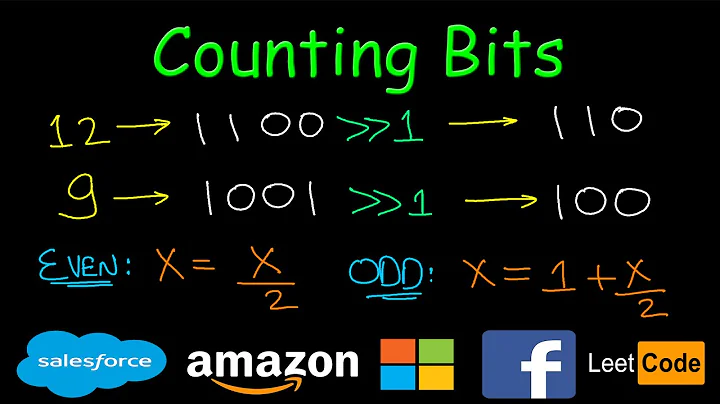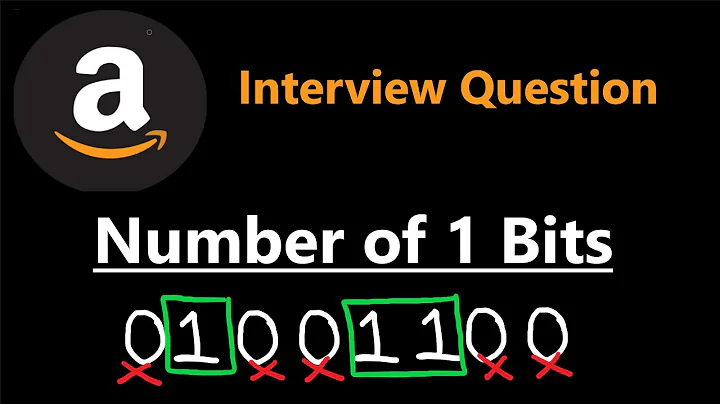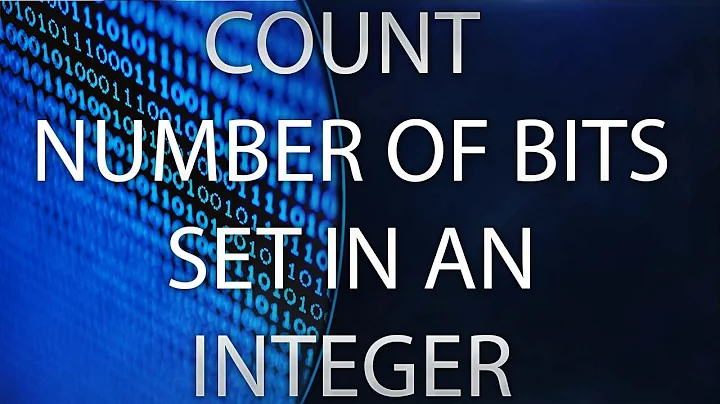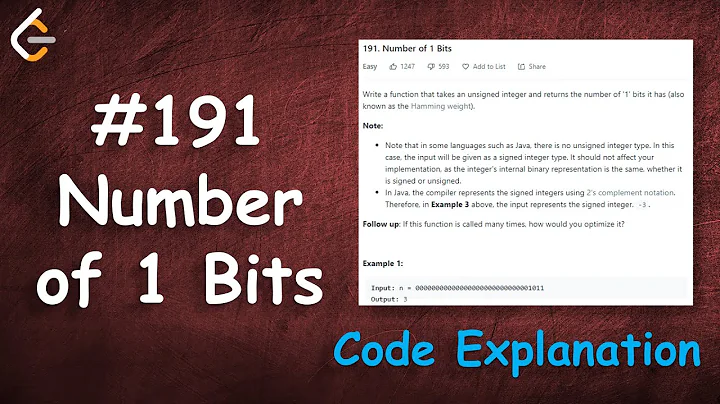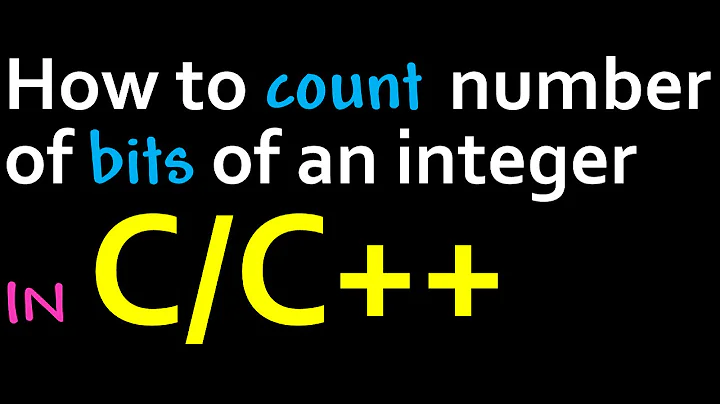Count number of bits in an unsigned integer
Solution 1
int bitCount(unsigned int n) {
int counter = 0;
while(n) {
counter += n % 2;
n >>= 1;
}
return counter;
}
Solution 2
Here's a solution that doesn't need to iterate. It takes advantage of the fact that adding bits in binary is completely independent of the position of the bit and the sum is never more than 2 bits. 00+00=00, 00+01=01, 01+00=01, 01+01=10. The first addition adds 16 different 1-bit values simultaneously, the second adds 8 2-bit values, and each one after does half as many until there's only one value left.
int bitCount(unsigned int n)
{
n = ((0xaaaaaaaa & n) >> 1) + (0x55555555 & n);
n = ((0xcccccccc & n) >> 2) + (0x33333333 & n);
n = ((0xf0f0f0f0 & n) >> 4) + (0x0f0f0f0f & n);
n = ((0xff00ff00 & n) >> 8) + (0x00ff00ff & n);
n = ((0xffff0000 & n) >> 16) + (0x0000ffff & n);
return n;
}
This is hard-coded to 32 bit integers, if yours are a different size it will need adjusting.
Solution 3
Turns out there are some pretty sophisticated ways to compute this as answered here.
The following impl (I learned way back) simply loops knocking off the least significant bit on each iteration.
int bitCount(unsigned int n) {
int counter = 0;
while(n) {
counter ++;
n &= (n - 1);
}
return counter;
}
Related videos on Youtube
user2054534
Updated on November 22, 2020Comments
-
user2054534 over 3 years
I want to write a function named
bitCount()in the file:bitcount.cthat returns the number of bits in the binary representation of its unsigned integer argument.Here is what I have so far:
#include <stdio.h> int bitCount (unsigned int n); int main () { printf ("# 1-bits in base 2 representation of %u = %d, should be 0\n", 0, bitCount (0)); printf ("# 1-bits in base 2 representation of %u = %d, should be 1\n", 1, bitCount (1)); printf ("# 1-bits in base 2 representation of %u = %d, should be 16\n", 2863311530u, bitCount (2863311530u)); printf ("# 1-bits in base 2 representation of %u = %d, should be 1\n", 536870912, bitCount (536870912)); printf ("# 1-bits in base 2 representation of %u = %d, should be 32\n", 4294967295u, bitCount (4294967295u)); return 0; } int bitCount (unsigned int n) { /* your code here */ }Okay, when I just run this I get:
# 1-bits in base 2 representation of 0 = 1, should be 0 # 1-bits in base 2 representation of 1 = 56, should be 1 # 1-bits in base 2 representation of 2863311530 = 57, should be 16 # 1-bits in base 2 representation of 536870912 = 67, should be 1 # 1-bits in base 2 representation of 4294967295 = 65, should be 32 RUN SUCCESSFUL (total time: 14ms)It doesn't return the correct numbers of bits.
What's the best way to return the number of bits in the binary representation of its unsigned integer argument in C?
-
ogzd about 11 yearswhat did you try in
bitCount()? -
Hot Licks about 11 yearsI think you're missing "your code here".
-
harold about 11 yearsWould you be allowed to use
__builtin_popcount?
-
-
user2054534 about 11 yearsthank you, could you explain a bit more too? would be nice like i can cleaerly read your code, but I don't understand why it works
-
ogzd about 11 yearsAccording to the "-1", I should leave the understanding part to you as a practice
-
user2054534 about 11 yearsi didn't downvote it it won't even let me vote "vote up requires 15 reputation" "vote down requires 125"
-
Barmar about 11 yearsThink about what each line does, it should become obvious. This is how you learn.
-
user2054534 about 11 yearsi don't understand what n>>=1; does though any hint?
-
 Nikos C. about 11 years@user2054534
Nikos C. about 11 years@user2054534n >>= 1is the same asn = n >> 1. -
 phuclv almost 11 yearsThis method is naive and slow. There are many much faster algorithms to cound bit in this page
phuclv almost 11 yearsThis method is naive and slow. There are many much faster algorithms to cound bit in this page -
 chux - Reinstate Monica over 5 yearsIMO, using
chux - Reinstate Monica over 5 yearsIMO, using%with/or&with>>is more consistent than%with>>. Withnasunsigned, code can mix and match. Yet using arithmetic xor logical operators is less jarring to read. -
Pyjong about 5 yearsI don't get it but holy Jeebus it just werks, so I'm going to put in the effort to understand this. Thanks!!
-
Pyjong about 5 yearsOk now I get it, this is epic
-
 theonlygusti about 3 yearsNo the linked resource about the hamming weight is totally different. Hamming weight (
theonlygusti about 3 yearsNo the linked resource about the hamming weight is totally different. Hamming weight (0b10000) is 1 because only 1 bit is set. However bitCount(0b10000) is correctly 5 -
Mark Ransom over 2 years@theonlygusti did you even try this code? ideone.com/MEHIkC Each pass through the loop knocks out a 1 bit, completely ignoring the 0 bits.

